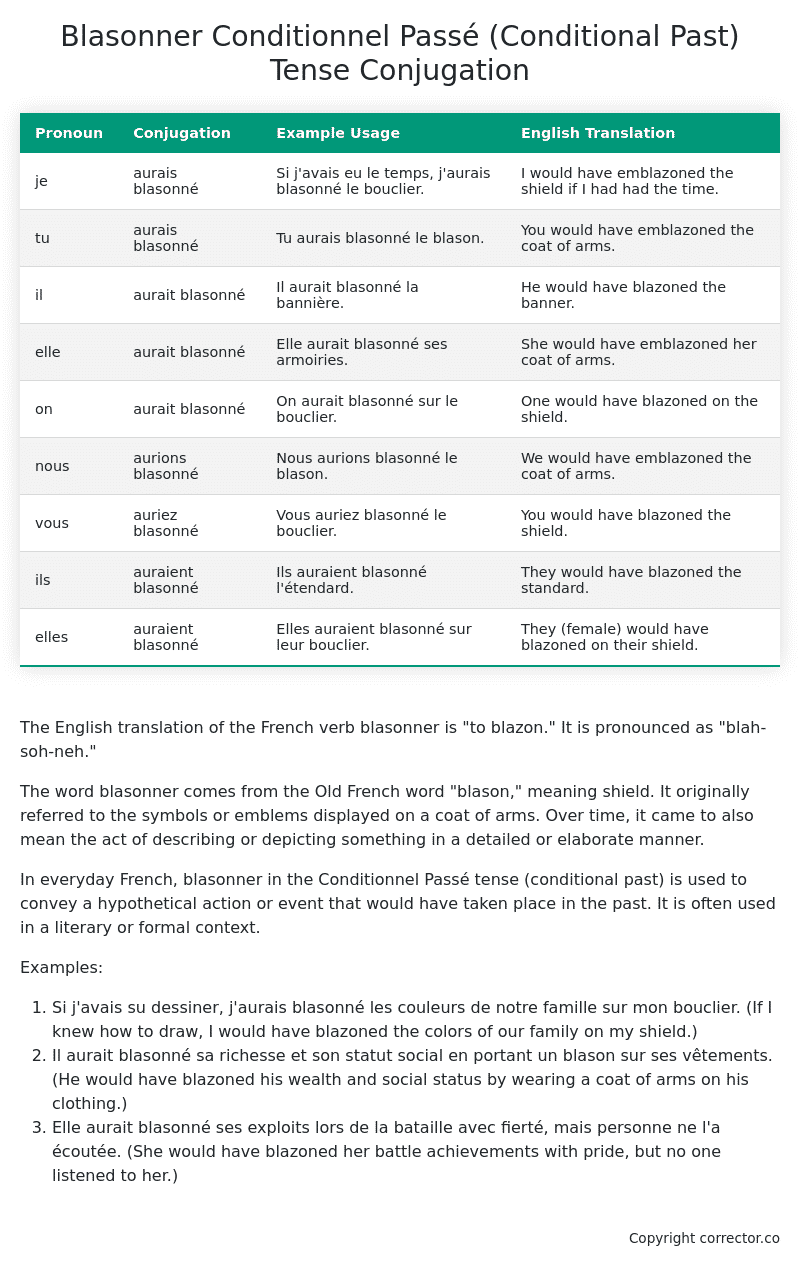Conditionnel Passé (Conditional Past) Tense Conjugation of the French Verb blasonner
Introduction to the verb blasonner
The English translation of the French verb blasonner is “to blazon.” It is pronounced as “blah-soh-neh.”
The word blasonner comes from the Old French word “blason,” meaning shield. It originally referred to the symbols or emblems displayed on a coat of arms. Over time, it came to also mean the act of describing or depicting something in a detailed or elaborate manner.
In everyday French, blasonner in the Conditionnel Passé tense (conditional past) is used to convey a hypothetical action or event that would have taken place in the past. It is often used in a literary or formal context.
Examples:
- Si j’avais su dessiner, j’aurais blasonné les couleurs de notre famille sur mon bouclier. (If I knew how to draw, I would have blazoned the colors of our family on my shield.)
- Il aurait blasonné sa richesse et son statut social en portant un blason sur ses vêtements. (He would have blazoned his wealth and social status by wearing a coat of arms on his clothing.)
- Elle aurait blasonné ses exploits lors de la bataille avec fierté, mais personne ne l’a écoutée. (She would have blazoned her battle achievements with pride, but no one listened to her.)
Table of the Conditionnel Passé (Conditional Past) Tense Conjugation of blasonner
| Pronoun | Conjugation | Example Usage | English Translation |
|---|---|---|---|
| je | aurais blasonné | Si j’avais eu le temps, j’aurais blasonné le bouclier. | I would have emblazoned the shield if I had had the time. |
| tu | aurais blasonné | Tu aurais blasonné le blason. | You would have emblazoned the coat of arms. |
| il | aurait blasonné | Il aurait blasonné la bannière. | He would have blazoned the banner. |
| elle | aurait blasonné | Elle aurait blasonné ses armoiries. | She would have emblazoned her coat of arms. |
| on | aurait blasonné | On aurait blasonné sur le bouclier. | One would have blazoned on the shield. |
| nous | aurions blasonné | Nous aurions blasonné le blason. | We would have emblazoned the coat of arms. |
| vous | auriez blasonné | Vous auriez blasonné le bouclier. | You would have blazoned the shield. |
| ils | auraient blasonné | Ils auraient blasonné l’étendard. | They would have blazoned the standard. |
| elles | auraient blasonné | Elles auraient blasonné sur leur bouclier. | They (female) would have blazoned on their shield. |
Other Conjugations for Blasonner.
Le Present (Present Tense) Conjugation of the French Verb blasonner
Imparfait (Imperfect) Tense Conjugation of the French Verb blasonner
Passé Simple (Simple Past) Tense Conjugation of the French Verb blasonner
Passé Composé (Present Perfect) Tense Conjugation of the French Verb blasonner
Futur Simple (Simple Future) Tense Conjugation of the French Verb blasonner
Futur Proche (Near Future) Tense Conjugation of the French Verb blasonner
Plus-que-parfait (Pluperfect) Tense Conjugation of the French Verb blasonner
Passé Antérieur (Past Anterior) Tense Conjugation of the French Verb blasonner
Futur Antérieur (Future Anterior) Tense Conjugation of the French Verb blasonner
Subjonctif Présent (Subjunctive Present) Tense Conjugation of the French Verb blasonner
Subjonctif Passé (Subjunctive Past) Tense Conjugation of the French Verb blasonner
Subjonctif Imparfait (Subjunctive Imperfect) Tense Conjugation of the French Verb blasonner
Subjonctif Plus-que-parfait (Subjunctive Pluperfect) Tense Conjugation of the French Verb blasonner
Conditionnel Présent (Conditional Present) Tense Conjugation of the French Verb blasonner
Conditionnel Passé (Conditional Past) Tense Conjugation of the French Verb blasonner (this article)
L’impératif Présent (Imperative Present) Tense Conjugation of the French Verb blasonner
L’infinitif Présent (Infinitive Present) Tense Conjugation of the French Verb blasonner
Struggling with French verbs or the language in general? Why not use our free French Grammar Checker – no registration required!
Get a FREE Download Study Sheet of this Conjugation 🔥
Simply right click the image below, click “save image” and get your free reference for the blasonner Conditionnel Passé tense conjugation!

Blasonner – About the French Conditionnel Passé (Conditional Past) Tense
Formation
Common Everyday Usage Patterns
Expressing Unreal Past Scenarios
Polite Requests or Suggestions
Expressing Doubt or Uncertainty
Interactions with Other Tenses
Conditional Present
Indicative Past Tenses
Conditional Future
Summary
Want More?
I hope you enjoyed this article on the verb blasonner. Still in a learning mood? Check out another TOTALLY random French verb conjugation!


